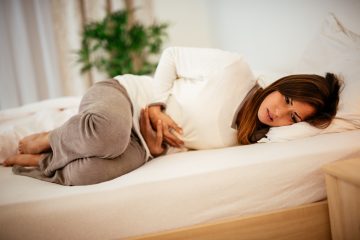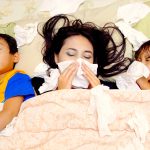What You Need to Know About PMS

With three teenage girls, understanding PMS is less of an intellectual endeavor and more of a survival skill. I often wonder how much of the foul mood, the needing to be alone and the snippiness are organically due to premenstrual syndrome, and how much is just typical adolescent behavior. It isn’t that I am not sympathetic, because even though I don’t remember having PMS in my younger years, after children, I do notice a change in my mood and attitude the day before menstruation (or in my case, with no uterus, the day before I should be menstruating.)
Why? It seems after all these years of evolution, we could have evolved a better emotional system for handling something that happens every 28 days.
What we do know …
— Symptoms affect almost all women to some degree.
— Symptoms start 5 – 11 days before menstruation.
— Risk factors for more severe PMS include a history of depression, a family history of depression or PMS, substance abuse and emotional of physical abuse.
— 20 – 32% of women report that PMS significantly and negatively affects their lives
What we don’t know …
We don’t know what causes it. Experts suspect the emotional symptoms are due to the fluctuating levels of sex hormones and serotonin during this time. Physical symptoms are due to the release of prostaglandins which cause the uterus to contract and expel its lining. Severe cramps can be caused by increased prostaglandins, endometriosis (when the uterine tissue implants outside the uterus,) adenomyosis (when the tissue that lines your uterus implants in the muscle of the uterus) and cervical stenosis.
Symptoms include: bloating, pain, acne, sore breasts, GI changes, headaches, irritability, sadness, fatigue, depression, anxiety, difficulty sleeping and sugar cravings. Yup, it is amazing we can get through a month! What can you do about it?
Focus on the symptoms you are having. Keep track of when they start and what makes them worse. If you have bloating and headaches, cut down on processed foods the day before your symptoms usually start and consider taking ibuprofen or Naprosyn prophylactically before symptoms start.
If you get PMS acne, be more aggressive with facial cleansing, masks and anti-acne treatment the week before your period.
If your symptoms are mostly GI in nature, focus on a healthier diet with lots of water, fiber, fruits and vegetables.
If you suffer from emotional changes, make some plans, stay busy, get exercise, spend time outdoors and make sure to get enough protein and complex carbohydrates. Try keeping a journal of what you are feeling and when it starts and stops. Revisit it when you are in the throes of PMS. Sometimes, just knowing “this too shall pass” can lighten your emotional load.
If things get bad, don’t take them lying down. Talk with your gynecologist to discuss options that may help you. Something as simple as a low dose birth control pill can get you off the crazy roller coaster and put you on a smoother, maybe just a little bumpy, train ride.
If things get bad with your teenage daughter, take up a hobby that keeps you out of the house when she is home. I’ve learned avoidance and Chardonnay are the best antidotes to PPMS (parenting PMS.)




















